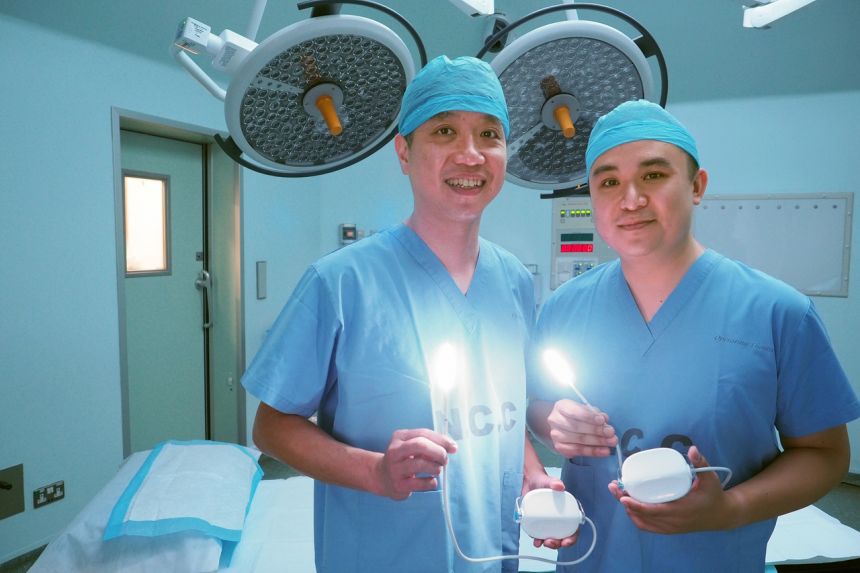
Associate Professor Tan Ngian Chye (left) and Dr Kevin Koh in 2018 with the Klaro. PHOTO: NATIONAL CANCER CENTRE SINGAPORE
SINGAPORE - Klaro, a bendable and disposable light device which can be used to illuminate cavities in open surgery, is now being used in some hospitals here.
The idea for such a device first occurred to Associate Professor Tan Ngian Chye, a senior consultant at the National Cancer Centre Singapore, some six years ago.
Watching his daughter play with a rubber ball that lit up every time it hit the ground inspired him to create a device that could illuminate the body from within and come in useful in operating theatres.
Surgical lights and head lamps cast shadows, causing surgeons some trouble, but with Klaro the issue disappears.
A prototype was jointly developed by local start-up Vivo Surgical, Singapore General Hospital's Medical Technology Office, National Cancer Centre Singapore and Panasonic Lighting Europe in 2018.
It was then further developed and made ready for use by Vivo Surgical, said the company's chief executive, Dr Kevin Koh.
Klaro is equipped with a large clip that can be fastened to various surfaces, and has a row of small LEDs (light-emitting diodes) at its tip. The LEDs are cooler than regular LEDs to avoid damaging body tissue.
Klaro will cost around $110 to $130 per piece, depending on the quantity purchased. The device can last for around four hours - sufficient for over 90 per cent of all open operations - before it has to be disposed of after use.
Klaro was officially launched at the Medica conference in Germany in November last year. Since then, over 1,100 sample units have been sold to distributors around the world.
It has received approval from the United States' Food and Drug Administration as well as Europe's CE mark certification. It also received approval for sale in Singapore from the Health Sciences Authority in January.
"In Singapore, sales have already begun to SingHealth hospitals and clinics, where several departments have approved Klaro for use in their operating theatres," said Dr Koh.
The device has proved to be particularly useful to clinicians performing head and neck surgery, as they now have to don personal protective equipment (PPE) for aerosol-generating procedures as part of Covid-19 precautions.
Dr Rahul Harshad Nagadia, a consultant from the National Dental Centre Singapore's Department of Oral and Maxillofacial Surgery, said many oral operations and dental procedures which require the use of high-pressure drills or water sprays often generate aerosol in the process.
However, aerosol-protective PPE can be bulky, as it generally includes an N95 mask, eye goggles with straps that go round the head, and a headlamp, which has straps that often entangle with the eye goggle straps, said Dr Rahul. It is also sometimes challenging to position and direct the headlight such that it illuminates the area for operation, he added.
In contrast, Klaro "is cheap, portable and disposable... and its flexible light cord, which can be placed close to the operative field, can allow you to direct light to areas that are not in a straight line", he said.
And while surgeons have to clean the headlamp thoroughly after each operation to avoid cross infection, using Klaro guarantees that "a new sterile light is used for each patient".
Clinical Associate Professor Goh Bee Tin, who is a senior consultant at the same department, said that wearing a headlamp also creates pressure around the head, which gives her a headache.
Both surgeons agreed that the device could be useful for surgeons dealing with the upper aerodigestive tract - which includes the nose, throat and mouth - as well as operations done in "deep and small cavities".
Currently, Vivo Surgical is working with over 17 distributors globally to bring the product to its markets, including countries in South-east Asia.
"Given the versatility of Klaro as a surgical light, it is fast becoming a useful add-on to other surgical devices in the market, even for specialised chemotherapy procedures. We are pleased that Klaro's utility is becoming apparent to the medical fraternity," said Dr Koh.













 Get it on Google Play
Get it on Google Play